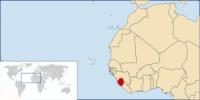|
|
|
Sierra Leone is now a constitutional republic, with a directly elected president and a unicameral legislature, known as the House of Parliament. The president is the head of state and the Head of government. The Judiciary of Sierra Leone is independent of the executive and the legislature and consist of the Supreme Court, Court of Appeals, High Court of Justice and magistrate courts. Judges of the Supreme Court, Court of Appeals and High Court of Justice are appointed by the president and subject to the approval by parliament. Thirteen of the country's fourteen district has its own directly elected local government called district council, headed by a Council Chairman. The country's six minicipalities of Freetown, Bo, Kenema, Koidu Town, Makeni and the island of Bonthe in turn have directly elected city councils, headed by mayors. Since Independence in 1961, Sierra Leone's politics have been dominated by two major political parties: the Sierra Leone People's Party (SLPP) and the All People's Congress (APC) [http://www.fco.gov.uk/en/travel-and-living-abroad/travel-advice-by-country/country-profile/sub-saharan-africa/sierra-leone [http://www.fco.gov.uk/en/travel-and-living-abroad/travel-advice-by-country/country-profile/sub-saharan-africa/sierra-leone. Other political parties have also existed throughout but with no significant supports. The country has relied on mining, especially diamonds, for its economic base; it is among the top 10 diamond producing nations in the world, and mineral exports remain the main foreign currency earner. Sierra Leone is also among the largest producers of titanium and bauxite, and a major producer of gold. The country has one of the world's largest deposits of rutile. Sierra Leone is also home to the third largest natural harbour in the world; where shipping from all over the globe berth at Freetown's famous Queen Elizabeth II Quay. Despite this natural wealth, over 70% of its people live in poverty [http://www.fco.gov.uk/en/travel-and-living-abroad/travel-advice-by-country/country-profile/sub-saharan-africa/sierra-leone. Sierra Leone is home to fifteen ethnic groups, each with its own language and customs. The two largest and most influential are the Mende and Temne. The Mende are predominantly found in South-Eastern Sierra Leone; the Temne likewise predominate in Northern Sierra Leone. Although English is the official language of Sierra Leone, the Krio language (derived from English and several indigenous African languages) is the most widely spoken language across the country, spoken as a first language by about 10%, but understood by 95% of the country's population and unites all the different ethnic groups, especially in their trade and interaction with each other. Sierra Leone is a predominantly Muslim nation, though with a large Christian minority. Sierra Leone is ranked as one of the most religiously tolerant nations in the world [http://eprints.soas.ac.uk/181/ [http://eprints.soas.ac.uk/181/[http://eprints.soas.ac.uk/181/. People are often married across tribal and religious boundaries. Muslims and Christians collaborate and interact with each other peacefully.[http://eprints.soas.ac.uk/181/. Religious violence is extremely rare in the country. Between 1991 and 2002 the Sierra Leone Civil War devastated the country leaving more than 75,000 people dead, much of the country's infrastructure and over two million people displaced in neighbouring countries; mainly to Guinea, which was home to more than six hundred thousand Sierra Leonean refugees [http://eprints.soas.ac.uk/181/. The war was resolved in 2002 after the Nigerian-led ECOMOG troops were heavily reinforced by a British force spearheaded by 1st Bn The Parachute Regiment, supported by the British Royal Navy The arrival of this force resulted in the defeat of rebel forces and restored the civilian government elected in 1998. On January 18, 2002 President Ahmad Tejan Kabbah declared the civil war officially over [http://eprints.soas.ac.uk/181/. Since then the country has re-established a functioning democracy. Early inhabitants of Sierra Leone included the Sherbro, Temne and Limba peoples, and later the Mende, who knew the country as Romarong, and the Kono who settled in the east of the country. In 1462, it was visited by the Portuguese explorer Pedro da Cintra, who dubbed it Serra de Leão, meaning "Lion Mountains". Sierra Leone later became an important centre of the transatlantic trade in slaves until March 11, 1792 when Freetown was founded by the Sierra Leone Company as a home for former enslaved from (or freed by) the British Empire. In 1808, Freetown became a British Crown Colony, and in 1896, and the interior of the country became a British Protectorate; in 1961, the two regions combined and gained independence. |




 RSS
RSS